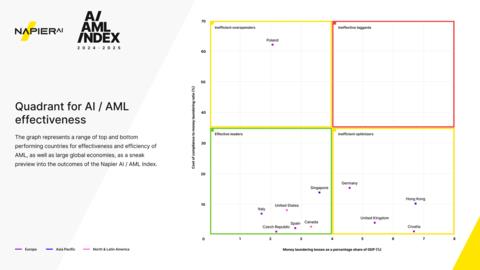
Global Economies Can Save $3.13 Trillion Annually Using AI To Detect And Prevent Money Laundering And Terrorist Financin...
The Napier AI / AML Index provides the industry's most comprehensive insights into the impact of AI on anti-money laundering and counter-terrorist financing (AML/CFT), it ranks 35 global markets based on their effectiveness in financial crime compliance.
Among the report's many key findings:
North America, the Nordics and Central Europe rank at the top, respectively, in terms of geographic regions with the smallest percentage of GDP lost to money laundering.
Italy, the Czech Republic and Finland rank at the top, respectively, in terms of countries with the most efficient spend on anti-money laundering.
Regulated firms like banks, payments firms, wealth & asset managers, telcos and insurance companies can save $138 billion USD on compliance costs by implementing AI into their AML strategies.
5% of global GDP-roughly $5.2 trillion-is funneled into the black market through money laundering.
Worldwide, the US stands to gain the most from AI-powered financial crime compliance solutions, potentially saving financial institutions $23.4 billion on compliance costs, followed by Germany ($14.2 billion), and France ($11.08 billion).
The United Arab Emirates has the highest GDP loss to financial crime globally, at 9.32%, followed by Brazil at 8.74%.
While financial institutions spend heavily on crime compliance, the investment is justified when it recovers billions and strengthens safeguards. The focus should be on spending effectively, using AI tools to boost both compliance and economic recovery.
Dr. Janet Bastiman, Napier AI's Chief Data Scientist, says:“Financial hubs are much more vulnerable to financial crime. Mature economies like Canada, the US and UK have effectively balanced open banking and AI innovation with the cost of managing financial crime risks. Fast-growing economies with strong financial services industries are looking to find this balance to reduce financial losses to the black market.”
Greg Watson, Napier AI's CEO, says:“We are at the tipping point where technology can drive monumental change in financial crime prevention. At Napier AI, we see AI not only as a tool but as a catalyst that can enhance compliance efforts globally, delivering better results with greater efficiency. The numbers from this year's Index are a testament to what is achievable when AI is effectively AML, in what we call a compliance-first approach.”
The Napier AI / AML Index uses GDP data, criminality data from UNODC and the Organized Crime Index, and compliance effectiveness from FATF and the Basel Index. It also includes insights from senior executives on the impact of AI on AML strategies.
Read the index here:
About Napier AI
Napier AI is a RegTech delivering anti-money laundering and financial crime compliance software to financial institutions, payments and wealth & asset management firms. Napier AI designs and engineers technological innovation to make a measurable difference in driving down financial crime. Trusted by over 150 institutions worldwide, the company's platform, Napier AI Continuum, is transforming compliance from a legal obligation to a competitive edge.
Improve your compliance processes with an award-winning solution
Get in touch to see how our intelligent platform can help your organisation transform its compliance; or request a demo to see it in action.
View source version on businesswire:
Permalink

Legal Disclaimer:
MENAFN provides the
information “as is” without warranty of any kind. We do not accept
any responsibility or liability for the accuracy, content, images,
videos, licenses, completeness, legality, or reliability of the information
contained in this article. If you have any complaints or copyright
issues related to this article, kindly contact the provider above.


















Comments
No comment